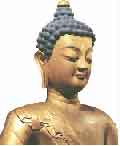28 May 2010, NewAgeIslam.Com
 God laws are eternal
and unalterable and not separable from God Himself. It is an indispensable
condition of His very perfection.
God laws are eternal
and unalterable and not separable from God Himself. It is an indispensable
condition of His very perfection.
Hence there is great confusion that the Buddha disbelieved in God and
simply believed in the moral law.
Because of this confusion about God Himself arose the confusion about
the proper understanding of the great word Nirvana. Nirvana is undoubtedly not
utter extinction. So far as I understand the central fact of the Buddha’s life,
Nirvana is utter extinction of all that is base in us, all that is vicious in
us, and all that is corrupt and corruptible in us. Nirvana is not like the black
dead peace of the grave, but the living peace, the living happiness of a soul
which is conscious of itself and conscious of having found its own abode in the
heart of the Eternal...
Non-violence is an intensely active force when properly understood
and used. A violent man’s activity is most visible, while it lasts. But it is
always transitory ... as transitory as that of Chenghis’s slaughter. But the
effects of the Buddha’s non-violent action persist and are likely to grow with
age. And the most it is practised, the more effective and inexhaustible it
becomes, and ultimately the whole world stands agape and exclaims: ‘a miracle
has happened’. -- M K
Gandhi
By M K Gandhi
May 28, 2010
God laws are eternal and unalterable and not separable from God
Himself. It is an indispensable condition of His very perfection.
Hence there is great confusion that the Buddha disbelieved in God and
simply believed in the moral law.
Because of this confusion about God Himself arose the confusion about
the proper understanding of the great word Nirvana. Nirvana is undoubtedly not
utter extinction. So far as I understand the central fact of the Buddha’s life,
Nirvana is utter extinction of all that is base in us, all that is vicious in
us, and all that is corrupt and corruptible in us. Nirvana is not like the black
dead peace of the grave, but the living peace, the living happiness of a soul
which is conscious of itself and conscious of having found its own abode in the
heart of the Eternal...
Gautama taught the world to treat even the lowest creatures as equal
to himself. He held the life of even the crawling creatures of the earth to be
as precious as his own. It is arrogant assumption to say that human beings are
lords and masters of ‘lower’ creation. On the contrary, being endowed with
greater things of life, they are trustees of the lower animal kingdom. And the
great sage lived that truth in his own life. I read as a mere youngster a
passage in the Light of Asia describing how the Master took the lamb on his
shoulders in the face of the arrogant and ignorant Brahmins who thought that by
offering the blood of these innocent lambs they were pleasing God, and he dared
them to sacrifice a single one of them. His very presence softened the stony
hearts of the Brahmins. They looked up to the Master, they threw away their
deadly knives and every one of those animals was saved.
The Buddha said, if you want to do any sacrifice, sacrifice yourself,
your lust, all your material ambitions, all worldly ambition. That will be an
ennobling sacrifice. His was the right path, right speech, right thought and
right conduct. He gave us the unadulterated law of mercy. And the extent of the
law as he defined it went beyond the human family. His love, his boundless love
went out as much to the lower animals, to the lowest life as to the human
beings. And he insisted upon purity of life...
Life is not a bundle of enjoyments, but a bundle of duties. That
which separated man from beast essentially man’s recognition of the necessity of
putting a series of restraints to worldly enjoyment...
Explore the limitless possibilities of non-violence or ahimsa. It is
definitely greater than the gems and the diamonds people prize so much. It can
become, if you make wise use of it, your own saving and saving of mankind.
Non-violence is an intensely active force when properly understood
and used. A violent man’s activity is most visible, while it lasts. But it is
always transitory ... as transitory as that of Chenghis’s slaughter. But the
effects of the Buddha’s non-violent action persist and are likely to grow with
age. And the most it is practised, the more effective and inexhaustible it
becomes, and ultimately the whole world stands agape and exclaims: ‘a miracle
has happened’.
Excerpt from The Way Of The Buddha.
Source: The Times of India




 Sultan Shahin
Sultan Shahin


0 comments:
Post a Comment